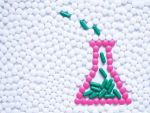SARS-CoV-2 research with chitosan - publications to date
The corona virus disease COVID-19 has changed the world. To combat the pandemic, researchers and companies around the world are working to develop vaccines and medicines. Chitosan also has potential in the area of vaccine development and functionalization of protective equipment such as respirators. We have prepared summaries of recent publications on chitosan as an aid in the fight against corona.



 Get more information about:
Get more information about:




